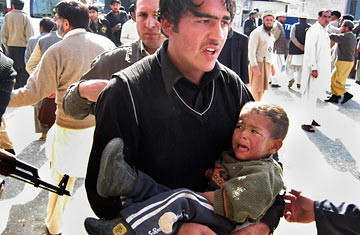
A man carries an injured boy away from the site of a bombing, which hit near a school and killed three U.S. soldiers in the town of Timergara in Pakistan's North-West Frontier Province
By killing three U.S. soldiers in a bomb attack in a remote corner of northwest Pakistan on Wednesday, Feb. 3, the Taliban scored a political jackpot. With anti-American sentiment cresting in Pakistani public opinion, the presence of the three American trainers in a convoy passing through Koto village when it was struck by a roadside bomb has set off a flurry of questions and even wild conspiracy theories about the U.S. presence in the country. The news left Islamabad in a difficult position, deepened suspicion of the U.S. and further strained an already troubled relationship.
The trainers' presence had been Pakistan's worst-kept secret. They're here at the invitation of the paramilitary Frontier Corps, the front-line force in the battle against the Pakistan Taliban, to help improve its poor counterinsurgency capability. In 2008, Washington dispatched 100 military personnel to train Pakistani officers, who would in turn pass on their skills to rank-and-file soldiers; but local sensitivities precluded the Americans from being given direct access to the troops. As U.S. special envoy Richard Holbrooke told reporters in Washington, "There is nothing secret about their presence there."
On Wednesday, a group of these trainers was traveling in a convoy with Pakistani security forces and local journalists to a school freshly renovated at U.S. expense. They had been invited to attend its opening ceremony, a symbolically significant event in a former Taliban stronghold where girls' schools were routinely bombed. As they rolled through Koto, a roadside bomb exploded near a girls' school along the way.
Three of the Americans were killed, two others injured. Also among the dead were two teenage schoolgirls and a Pakistani paramilitary. More than 100 people were injured, most of them schoolgirls, according to Médecins Sans Frontières doctors at a local hospital. Television images showed grim but now depressingly familiar scenes of the charred remains of nearby cars, broken masonry from the school building, scattered books and bags, and rescue workers scrambling through the debris in search of survivors.
While Taliban attacks on girls' schools have been common and helped rally Pakistani public opinion behind a military campaign to drive the movement out of areas it had taken over, there are few doubts that the U.S. personnel were the targets.
In recent months, wild but potent conspiracy theories have been keenly promoted by sectors of the Pakistani media and political opposition. Figuring most prominently among them has been the allegation that the U.S. security contractor Xe Services, previously known as Blackwater, has been operating with impunity throughout the country. Exploiting such sentiment, the Taliban described Wednesday's attack as "revenge for the blasts carried out by Blackwater in Pakistan."
The attack, in an area believed to have been cleared of militants, comes at a particularly sensitive moment for Washington-Islamabad relations. In recent weeks, the CIA has dramatically escalated its covert drone-launched missile strikes on suspected militants in the tribal wilds of North Waziristan, which borders Afghanistan. Pakistani military officials are still trying to confirm whether a Jan. 17 attack fatally wounded Pakistani Taliban leader Hakimullah Mehsud.
While the Taliban deny that Hakimullah was killed, they had initially issued similarly fierce denials when his predecessor, Baitullah Mehsud, was killed by a drone strike last August. There are strong signs that a change of leadership may be under way in the ranks of the Pakistani Taliban. According to local reports, Hakimullah was taken to Mamozai village in Orakzai tribal agency, where he had first emerged as a Taliban commander and where his second wife lives. A doctor was summoned from nearby Hangu to treat his injuries. But well-placed sources believe Hakimullah died from his injuries and was buried in the village last week.
If confirmed, Hakimullah's death would represent a major victory for both Washington and Islamabad. Pakistan's most wanted man had claimed responsibility for the Dec. 30 suicide bombing by a Jordanian triple agent who killed half a dozen CIA personnel on a base in Afghanistan's Khost province. He had also claimed credit for a series of high-profile terrorist attacks in Pakistan and the ongoing wave of violence across the country that has killed more than 600 people since October.
But the now almost daily drone strikes remain unpopular in Pakistan, whose government publicly denounces the attacks but has privately nodded its assent and offered the use of bases on its soil. Even Taliban militants recently acknowledged the effectiveness of the drone war. "Westerners have some regard for civilians, and they do distinguish between Taliban fighters and civilians, but the Pakistani army doesn't," says a pamphlet distributed recently in North Waziristan by the pro-Taliban Council of United Holy Warriors. "Instead of the Taliban, it is bombing ordinary people's homes and their bazaars and killing innocent people."
Anti-American sentiment was further stoked Wednesday just hours after news broke of the three U.S. personnel killed in Koto, when a New York City court convicted Aafia Siddiqui, a Pakistani scientist, of the attempted killing of U.S. personnel after she had been captured in Afghanistan. The verdict triggered an outpouring of rage across the Pakistani media and political class, which has long championed Siddiqui as a victim of alleged American brutality.
The p.r. setbacks come as Washington struggles to persuade Pakistan to turn up the heat on Taliban and related militants who use its territory to mount operations against NATO troops in Afghanistan. Last month, as Defense Secretary Robert Gates was visiting, the Pakistan military's chief spokesman said there were no plans to launch fresh offensives for at least six months, if not a year. That was a pretty blunt "No" to the Americans. Now, with suspicions deepening over the nature and extent of the U.S. presence in Pakistan, winning its cooperation and shifting public attitudes has become an even more trying task.
